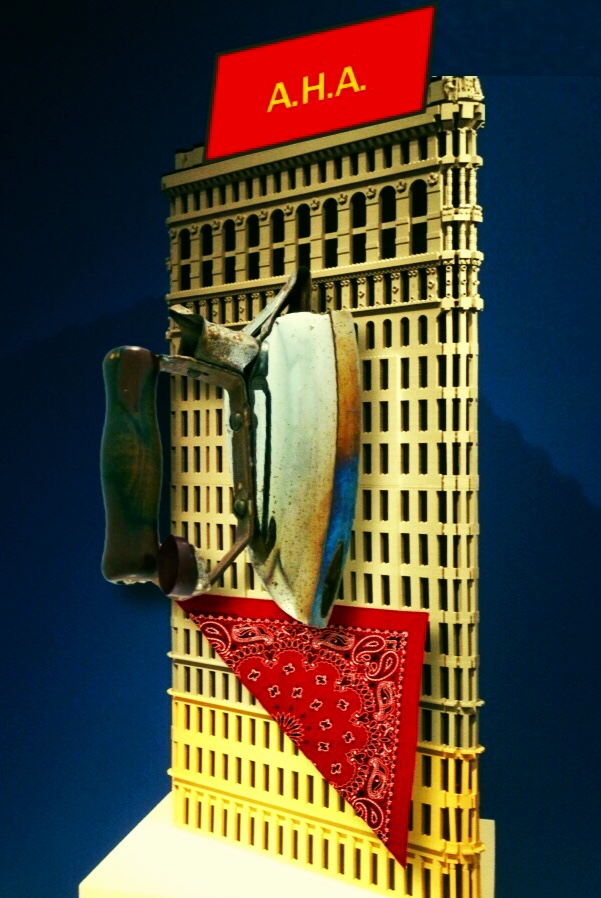It’s not enough that they have the most offensive piece of tallish architecture in Philadelphia, some fauvist mockery of the Flatiron Building. It’s not enough that their press release announced the sad suicide of Hunter S. Tompson with two chilling sentences: “Hunter Tompson shot himself in the head. He died.” From there they went on to prove why eulogies are better short.
Now they’ve opened a controversial exhibit about the great Pennsylvania short story writer and novelist John O’Hare. It features a one minute movie with a voiceover narration drowned out by a dinning bit of Muzak. Hard copy of the narration is handed out hopefully with the tickets, seeming to promise more. Which isn’t there.
As a true American original, John O’Hare came to the sophisticated pages of the New Yorker from a hard scrabble town or city called, um, Pottsville, PA. It was a place with people, buildings, more buildings, a statue, and dreams. And stories. All of these were typically, uniquely American, and John O’Hare got famous telling his mundanely original stories about a place called Gibbsville, a town or city a lot like Reading, PA. O’Hare told his stories in a brand new American way, which was in about a thousand words give or take. Which is what led to all those very long novels that became movies and ended his writing career. But he got rich, which still didn’t make up for not going to Yail.
And here’s the stale donut of a film tribute to the distinguished O’Hara:
[INSERTS TO COME]
As a true American original, John Upcreek came to the sophisticated pages of the New Yorker from a hard scrabble town or city called, um, Reading, PA. It was a place with people, buildings, more buildings, a statue, and dreams. And stories. All of these were typically, uniquely American, and John Upcreek got famous telling his mundanely original stories about a place called Brewer, a town or city a lot like Pottsville, PA. Upcreek told his stories in a brand new American way, which was in words specially chosen for you by a Harvurd summa cum laude. Which is what led to all those novels about that same guy from Gibbsville that should have become movies and ended his writing career. But thanks to not many movies, his writing career kept going and he still got rich, which is why he was so smart to go to Harvurd instead of Yail.
Rabbit Is Senile
Chapter One
Here I go again, with another brilliant display of writing. It’s amazing, even to me, that I can write this well, so transparently that it seems the scenes are just unfolding themselves out of the ether, but then again with that additional turn or twist or tweak which make it inescapably clear that we’re in the hands of Upcreek the master. I started out with this much talent all the way back when I was a summa cum laude English major at Harvard, and I’ve never stopped producing. Every piece I do for The New Yorker, every smug review and essay, every one of these damn Rabbit novels—they’re all, always, brimming with talent. It’s just so fucking beautiful the way I use words that everyone, including me, is rapt, so that even though we’re still in the first paragraph of Rabbit is Senile, all my readers have already zoomed back to where Rabbit’s life was when we left off last time, and they can taste and feel and hear the tiniest incidentals of his experience, which at the moment have to do with the fact that his diaper has just been soiled and he is grappling in the depths of his bleached and porous memory for some identification of the experience of having a bowel movement.
Only I can get away with this kind of scrupulously unblinking description, because I do it so damn well, and it doesn’t matter a farthing that nobody out there, or in here, gives a shit about Rabbit—they come to me for the performance alone, the way they would go to see Luciano Pavorotti sing arias out of context.
And if, in this case, the aria is but a cheap rehash of characters that were never that interesting in the first place, it’s still okay, because prose this beautiful accomplishes the miracle of demonstrating that life itself cannot live up to the glory of my talent with words. And if it is a joke that I am, at this very instant, describing in meticulous compleatness the content of Rabbit’s Pamper, it is not a small joke or a venal one; it is rather part of the grand joke that I and my readers share about life—if only, we all sigh and chuckle and exclaim, if only life were as fine as the writing of John Upcreek. And as we sigh and chuckle together, I can begin my next tour de force by bringing this stinking Pamper to the brink of your very nostrils and holding it there for long minutes, while arma virumque cano Troiae qui primus ab oris Laviniamque venit. Multa ille terris iactatis et alto. Dux femina facta. Forsan et haec olim meminisse iuvabit.
Arma virumque cano Troiae qui primus ab oris Laviniamque venit. Multa ille terris iactatis et alto. Dux femina facta. Forsan et haec olim meminisse iuvabit. Arma virumque cano Troiae qui primus ab oris Laviniamque venit. Multa ille terris iactatis et alto. Dux femina facta. Forsan et haec olim mem-inisse iuvabit. Arma virumque cano Troiae qui primus ab oris Laviniamque venit. Multa ille terris iactatis et alto. Dux femina facta. Forsan et haec olim meminisse iuvabit.
Arma virumque cano Troiae qui primus ab oris Laviniamque venit. Multa ille terris iactatis et alto. Dux femina facta. Forsan et haec olim meminisse iuvabit. Arma virumque cano Troiae qui primus ab oris Laviniamque venit. Multa ille terris iactatis et alto. Dux femina facta. Forsan et haec olim mem-inisse iuvabit. Arma virumque cano Troiae qui primus ab oris Laviniamque venit. Multa ille terris iactatis et alto. Dux femina facta. Forsan et haec olim meminisse iuvabit. Arma virumque cano Troiae qui primus ab oris Laviniamque venit. Multa ille terris iactatis et alto. Dux femina facta.


